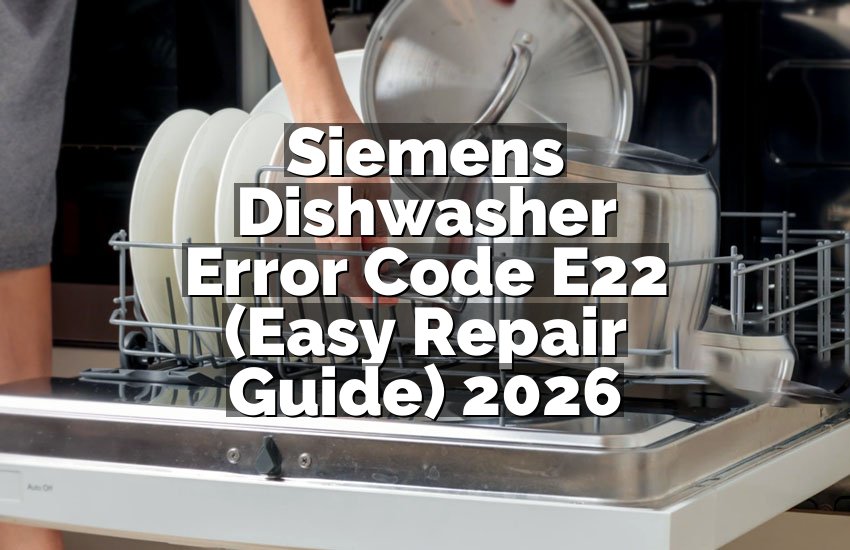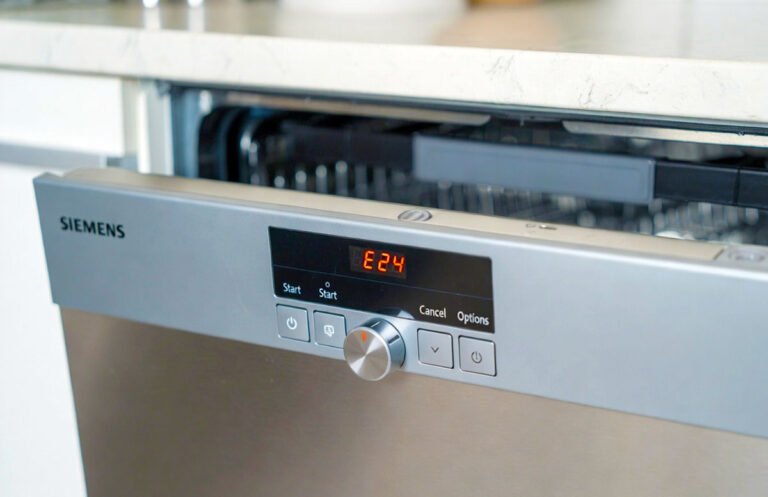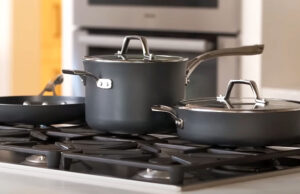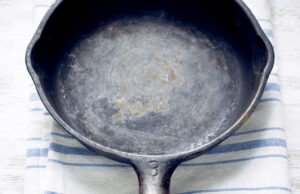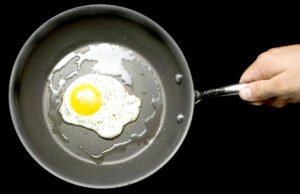As an Amazon Associate, I earn from qualifying purchases at no extra cost to you.
Neff Dishwasher Not Draining? Quick and Easy (5 Steps)
If your Neff dishwasher is not draining, the quick answer is simple: most of the time, it is a clogged filter, blocked hose, or a faulty pump. Cleaning the filter, checking the drain hose, or restarting the dishwasher usually solves the issue. You do not always need a repairman right away. With a few simple checks, you can get your dishwasher draining again and avoid water from staying at the bottom.
Check and Clean the Filter
When your Neff dishwasher does not drain, the first thing you should always check is the filter. The filter is at the bottom of the dishwasher and often collects food bits, grease, or soap residue. If it is blocked, the water has no way to pass through. Cleaning this part is one of the easiest and most effective ways to solve the problem.
To start, open the dishwasher door and pull out the bottom rack. You will see the filter assembly right under the spray arm. Most models let you twist it counterclockwise to remove it. Once removed, rinse it under warm water and scrub with a small brush. If there is grease, you can soak it in warm soapy water for a few minutes. A clean filter allows water to pass freely.
Next, make sure you also check the area around the filter housing. Sometimes, small pieces of food or even broken glass can get stuck inside. You can use a cloth or even a small spoon handle to gently clear it out. Do not push debris further inside, as that can block the pump. A clear filter area helps the pump pull out water smoothly.
After cleaning, place the filter back properly. Make sure it is locked tightly in place. A loose filter can cause the same issue again. Cleaning the filter every week is a good habit. It not only helps drain but also keeps your dishes cleaner. Many people skip this and face drainage problems again and again.
- Remove and rinse the filter under warm water.
- Scrub food bits and grease off with a brush.
- Clear the filter housing of debris.
- Lock the filter back tightly in place.
Inspect the Drain Hose
Another common reason a Neff dishwasher will not drain is a blocked or kinked drain hose. This hose carries dirty water out of the dishwasher into your sink drain or garbage disposal. If water is not moving out, it could be because the hose is clogged with food particles or bent in the wrong position.
First, locate the hose. It is usually connected behind the dishwasher and linked to the sink drain. If the dishwasher is built-in, you may need to gently pull it forward to see the back. Once you find the hose, check if it is bent or twisted. Straighten it carefully and see if this solves the problem. Even a small kink can stop water flow.
If it looks fine, the next step is to check for clogs. Disconnect the hose from both ends. You may need pliers to loosen the clamps. Hold the hose over a bucket and run water through it. If water does not flow freely, then there is a blockage. You can use a long, flexible brush or even a straightened wire hanger to push debris out.
Sometimes, grease buildup inside the hose can cause a sticky blockage. In that case, pouring hot water mixed with vinegar through the hose can help dissolve it. Once it is clear, reconnect it tightly. Make sure both ends are sealed well to avoid leaks later. A clean and straight hose ensures the dishwasher drains without issues.
- Check for kinks or twists in the hose.
- Disconnect and flush the hose with water.
- Use a brush or wire to clear blockages.
- Reconnect tightly and check for leaks.
Examine the Drain Pump
If your Neff dishwasher still does not drain, then the issue may be with the drain pump. The pump is what pushes the water out. If it is blocked or broken, the water will stay inside. Checking this part takes a little more effort, but it is still something many people can do at home with patience.
First, turn off the power to your dishwasher. Safety should always come first. Remove the bottom racks and take out the filter, because the pump is located underneath. You may need to unscrew the pump cover. Once you reach it, look for any small objects stuck inside, like seeds, bones, or even bits of broken glass. These can jam the pump impeller.
Gently spin the impeller with your finger to see if it moves freely. If it feels stiff or blocked, clean it carefully. Use a cloth to wipe away any dirt or grease. If you see damage, like broken blades or cracks, then the pump may need replacement. This might be the moment when you call a repairman, but many times a simple cleaning fixes it.
After cleaning, reassemble everything and run a short cycle to test. If you hear the pump running but water still does not drain, the pump motor may be failing. That is not common, but it happens. Either way, checking the pump early helps you avoid bigger problems later.
- Always turn off power before working.
- Check for small objects inside the pump.
- Spin the impeller to ensure it moves.
- Clean or replace if damaged.

Look at the Garbage Disposal Connection
Sometimes the dishwasher is fine, but the problem comes from where the drain hose connects to the sink or garbage disposal. If you have a garbage disposal, the knockout plug might not have been removed. This small plug blocks water from going out, and if it is still in place, the dishwasher will not drain.
To check this, look under your sink where the hose connects to the disposal. If the dishwasher was recently installed, this is a common mistake. Use a screwdriver and a hammer to gently knock out the plug if it is still there. Remove it and make sure the hose is connected firmly again. This small detail can save hours of frustration.
Even without a knockout plug, food or grease buildup inside the disposal inlet can block water flow. Run the disposal for a few seconds with cold water running. This helps clear the line and makes sure the path is open. If the water drains when you do this, the problem was not the dishwasher but the sink connection.
It is also smart to check the sink drain trap. Sometimes clogs here prevent the dishwasher from draining. Loosen the trap and clean it if needed. Always place a bucket underneath to catch water. Once you clean the connection, try running the dishwasher again to see if it now drains properly.
- Check for knockout plug in garbage disposal.
- Run disposal to clear food buildup.
- Clean sink drain trap if blocked.
- Reconnect hose firmly to the disposal.
Reset the Dishwasher
When nothing seems wrong, a simple reset can sometimes fix draining issues. Dishwashers have control boards, and sometimes they just get confused. Resetting clears the error and allows the machine to work again. Many Neff owners are surprised at how often this simple trick works.
To reset, turn off the dishwasher using the power button. Wait a few minutes, then switch it back on. On some models, you may need to press and hold the start button for a few seconds until the display clears. Always check your manual for the exact steps. After resetting, run a short rinse cycle to see if the water drains.
This step works when the machine thinks it has a blockage, even if you already cleaned everything. It is like giving your dishwasher a fresh start. If it works after a reset, you saved yourself time and stress. If it still does not drain, then at least you know the issue is mechanical, not electronic.
Doing a reset once in a while does not harm the dishwasher. It can even solve minor errors. Think of it as restarting your phone when it freezes. Simple but effective. Always try this before calling for service, as it costs nothing and may save you a repair bill.
- Turn off dishwasher and wait a few minutes.
- Press and hold start button if needed.
- Run a short cycle after resetting.
- Use reset to clear small errors.
When to Call a Professional
If you have cleaned the filter, checked the hose, looked at the pump, cleared the disposal, and even reset the dishwasher, yet water still stays inside, then it may be time to call a professional. Some issues are too complex or require special parts that only a technician can handle. Knowing when to stop trying saves time and avoids damage.
For example, if the drain pump motor is burnt out, it will need replacement. That is not something most people can do safely at home. Also, if the control board is faulty, you will need a skilled repairman to test and replace it. These parts are expensive, so a proper diagnosis matters.
Calling a professional also gives you peace of mind. They can check electrical parts, sensors, or hidden clogs you may have missed. If your dishwasher is still under warranty, it is better not to open it too much, because it can void the cover. In that case, let the company handle the repair.
Still, trying the simple fixes first is always worth it. Many people spend money on repairs when the only problem was a dirty filter. By following the above steps, you either fix it yourself or at least give clear info to the repairman. That can reduce repair costs and speed up the job.
- Call if pump motor or board fails.
- Do not risk breaking warranty.
- Let pros handle electrical repairs.
- Try easy fixes before paying money.
Final Thoughts
A Neff dishwasher not draining can feel frustrating, but most of the time it is not a big issue. With simple checks like cleaning the filter, clearing the hose, or resetting the unit, you can fix it on your own. And if it still does not work, calling a professional is the safe choice. Either way, you save time and keep your kitchen running smoothly.
| Problem | Fix |
|---|---|
| Filter dirty | Remove, clean, and replace |
| Hose blocked | Straighten and flush |
| Pump jammed | Clean or replace |
| Disposal blocked | Knock out plug and clear |
| Dishwasher error | Reset machine |
| Major damage | Call a repairman |
Frequently Asked Questions (FAQs)
Is it safe to keep using my Neff dishwasher if it does not drain?
No, it is not safe. If the water does not drain, dirty water sits inside and causes bad smells, mold, or even leaks. The pump can also get damaged if it keeps trying to run with standing water. It is always best to stop using the machine until you fix the issue. Otherwise, you might face bigger and more expensive problems later.
Can a dirty filter really stop my dishwasher from draining?
Yes, it can. The filter blocks food and dirt from entering the pump. When it is clogged, water has nowhere to go. This is one of the most common reasons people see water left at the bottom. Cleaning the filter is simple, but it makes a big difference. Regular cleaning also keeps dishes sparkling and avoids repeating the same problem again.
Do I need to remove the dishwasher to check the drain hose?
Not always. In many kitchens, you can reach the drain hose under the sink. But if the hose runs behind the dishwasher, you may need to pull it out a little. Be careful when moving the unit, so you do not damage the floor or water connections. If you cannot reach it safely, then it is better to get help rather than risk a bigger mess.
Is it hard to check the drain pump in a Neff dishwasher?
It is not very hard, but it does take some patience. You need to remove the racks, filter, and maybe a few screws. Once you see the pump, you can check for small objects stuck inside. If you feel unsure, you can still try the other steps first. Many times, cleaning the filter or hose solves the issue without needing to touch the pump at all.
Can resetting my Neff dishwasher really solve draining issues?
Yes, sometimes it can. Dishwashers run on control boards, and like any electronic device, they can get confused. A simple reset clears the memory and refreshes the system. This works especially if there is no real blockage, but the dishwasher thinks there is one. It takes only a minute to try, and it is always worth doing before calling for help.
Do I need special tools to fix a Neff dishwasher not draining?
Most of the time, you do not. You may need simple things like a screwdriver, pliers, or a small brush. A bucket and some towels are also helpful to catch water. For clogs in the hose, a flexible brush or wire hanger can work well. Only if you replace big parts, like the pump, would you need more tools, but for cleaning, simple tools are enough.
Is it expensive to fix a Neff dishwasher that does not drain?
It depends. If it is just a clogged filter or hose, then it costs almost nothing to fix yourself. But if the drain pump motor or control board is damaged, then the repair can cost more. Calling a repairman also adds labor fees. That is why it is smart to try the easy fixes first. Many times, you solve the problem without spending money at all.
Can I prevent draining problems in the future?
Yes, you can. Clean the filter at least once a week, and rinse big food scraps off plates before loading them. Make sure the drain hose is not bent or blocked, and run the garbage disposal regularly to keep it clear. Doing these small steps keeps your dishwasher in good shape. Preventing the problem is always better than dealing with standing water later.

